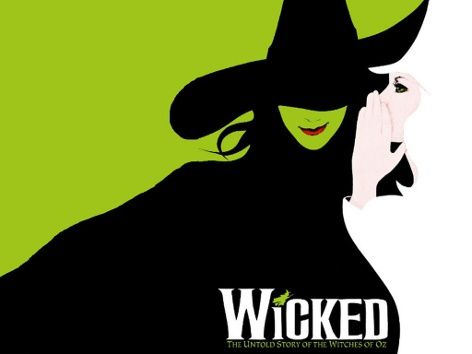
As some of you may know, yesterday was the last day of the local staging of the Australian production of the Broadway musical Wicked. If you’ve been wanting to see this play but haven’t done so, then you missed out on a really wonderful experience. I managed to watch the play late last month and I have to agree with what rudeboy said: it’s wicked good!
Wicked is basically “the untold story of the witches of Oz.” And that’s Oz, as in 1939 film The Wizard of Oz (starring Judy Garland) and the original children’s book by L. Frank Baum. Loosely based on a 1995 novel by Gregory Maguire, Wicked provides an alternate backstory to the Wicked Witch of the East (dubbed Elphaba, in honor of L. Frank Baum) and Glinda the Good Witch of the North imagining them as best friends before the arrival of Dorothy from Kansas.
Wicked was a smash hit on Broadway and songs like “Popular” (which has been sampled in Mika’s “Popular Song” featuring Ariana Grande), “For Good”, and “Defying Gravity” are now part of pop culture. The musical has also won numerous Tony Awards and Drama Desk Awards and has broken several theater-related box office records.
I was also able to see the local staging of The Phantom of the Opera. And while Phantom’s production design was utterly top-notch (the chandelier!), I have to say that I enjoyed Wicked more. The characters were more relatable, the story was more grounded despite the fantasy setting, and the themes of being different, of striving to do good, of unrequited love, and especially of friendship I think resonated with the audience more. The play is funny and emotional, and ultimately, it provided a satisfyingly feel-good experience. I’m familiar with several Wicked songs before I saw the play and it was quite a treat to finally see and appreciate the songs in their proper context. If there was one contrary thing I would say, I wish it was Idina Menzel and Kristin Chenoweth, the original Broadway actors, that portrayed Elphaba and Glinda, but I think Jemma Rix and Suzie Mathers did justice to the roles.
Interestingly, Oz is quite big in the gay community. The 1939 Oz film started with Kansas in black and white before proceeding with technicolor goodness once Dorothy arrives in Oz. This has been compared with the desire of LGBT people to escape the stifling small-town atmosphere to a place where they can show their true colors and be accepted (cue in the song “Somewhere Over the Rainbow”). Consequently, Judy Garland became a huge gay icon and the phrase “friend of Dorothy” became slang for a gay person.
Wicked is no less embraced by the gay community as well. For one thing, Wicked novel author Gregory Maguire is, in fact, gay and he lives with his husband in Massachusetts (the first U.S. state to legalize same-sex marriage). For another thing, many LGBT people could relate to Elphaba. The future witch was born different by having green skin and this caused her to be ostracized by peers and her father to be ashamed of her. Elphaba’s signature song “Defying Gravity” can also be considered as an anthem for gay people tired of “playing by the rules of someone else’s game” and declaring to their detractors: “you won’t bring me down.” In fact, Kurt, the gay character from Glee, sang this song during that TV series’ first season.
You don’t have to take Wicked’s gay leanings from me. You can read Gregory’s article where he shared how he injected his version of Oz with gay characters and themes. Or this musical review of the play in the context of gay bullying.
In short, if you’re gay, you ought to have seen Wicked, simply because it is good, and because it celebrates diversity.


